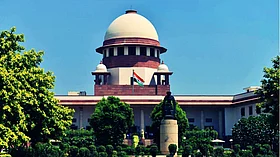Supreme Court Refuses to Hear Petition Against Gag Order on Temple Coverage
The Supreme Court of India has declined to entertain a petition challenging the gag order issued by a local court in Bengaluru. This order restricted media outlets from publishing any defamatory content related to the family managing the Sri Manjunatha Swamy temple and the temple itself, in connection with the ongoing mass grave burial case.
The apex court advised the petitioner to seek relief from the Karnataka High Court instead. A division bench consisting of Chief Justice B.R. Gavai, Justice K. Vinod Chandran, and Justice Joymala Bagchi passed this order, emphasizing that the matter should first be addressed by the High Court.
The petition argued that the gag order was issued ‘ex parte’—without notice or hearing the other side—and was passed within just three hours. It also highlighted that the order affected around 300 media houses and required the removal of approximately 9,000 links and news stories.
Chief Justice Gavai remarked, “We cannot discourage the High Courts,” while advising the petitioner to approach the Karnataka High Court for redressal. The petition contended that the gag order was an abuse of the judicial process and resulted from material misrepresentation by the plaintiffs. It further claimed that the order hindered a high-level state investigation into allegations of mass burials and serious crimes linked to the Dharmasthala temple. The petitioner argued that the order violated the principles of freedom of speech and the press.
Key Details of the Interim Gag Order
The interim gag order was issued by the 11th Additional City Civil and Sessions Court in Bengaluru on July 21. It prohibited individuals and media outlets from publishing or broadcasting defamatory content against the Dharmasthala temple, its religious head Dr D. Veerendra Heggade, his family members, and institutions managed by the family. The order was issued following a plea filed by D. Harshendra Kumar.
In its ruling, the civil court described the case as exceptional, noting that some individuals and media outlets had allegedly spread false and derogatory statements about the plaintiffs, their family, the Sri Manjunatha Swamy temple, and associated institutions without any basis.
The order stated: “The defendants are hereby directed, by way of ad-interim mandatory injunction, to delete/de-index all defamatory content and information against the plaintiff, his family members, institutions run by the plaintiff’s family, and Sri Manjunatha Swamy temple, Dharmasthala — whether in digital or print media — until further orders.”
Implications of the Gag Order
The petition alleged that the plaintiffs misrepresented facts before the court by claiming that the FIR in the case did not contain any allegations against them, their family members, or the institutions they manage. This led to the issuance of the gag order, which has raised concerns about the balance between judicial authority and media freedom.
The issue at hand involves significant legal and ethical questions regarding the right to report on matters of public interest, especially when it comes to allegations involving religious institutions and potential criminal activities. The Supreme Court’s decision to refer the matter to the High Court underscores the complexity of the case and the need for a thorough judicial review.
As the legal battle continues, the situation highlights the challenges faced by the media in reporting on sensitive issues while respecting the rights of individuals and institutions involved. The outcome of this case could set important precedents for future similar cases in India.







